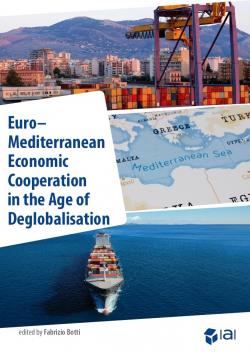Euro–Mediterranean Economic Cooperation in the Age of Deglobalisation
The pandemic crisis and the war in Ukraine, with its far-reaching geopolitical implications, have shown substantial vulnerabilities in many global supply chains that revamped the debate on the future of globalisation and the potentialities and downsides of reshoring, nearshoring or friendshoring processes. Indeed, the reconfiguration of global value chains has been increasingly debated as an economic policy tool to secure the supply of critical products and establish strategic autonomy at the EU level. The prospective restructuring of the position of Italy and the EU within the international production networks may favour the revitalisation of economic cooperation in the Mediterranean and the achievement of open strategic autonomy through enhanced interdependencies between the EU and its Southern neighbours, diversification of the access to key materials, and integration of partner countries in the area into the industrial supply chains. The main objective of the report is to explore the opportunities and challenges of an improved Euro-Mediterranean economic cooperation at times of geopolitical turbulence and the emergence of deglobalising trends and processes.
Publication produced in the framework of IAI strategic partnership with Compagnia di San Paolo Foundation and in collaboration with SRM.
-
Details
Rome, IAI, November 2022, 62 p. -
ISBN/ISSN/DOI:
978-88-9368-273-2
Foreword
Introduction
1. EU Open Strategic Autonomy and the Prospects for Economic Cooperation with Southern Neighbours, by Fabrizio Botti and Irene Paviotti
1.1 EU economic cooperation with its Southern Neighbourhood: Laying the groundwork for Mediterranean supply chains
1.1.1 The Southern Neighbourhood as a strategic partner
1.1.2 Current EU–Southern Neighbourhood economic cooperation
Conclusion
2. Trans-Mediterranean Connectivity as a Core of Supply-chain Resilience: Lessons from Euro–Maghreb Manufacturing Value Chains, by Michaël Tanchum
2.1 The Russia–Ukraine war and Europe–Maghreb automotive value-chain resilience
2.2 The cascading effect of Morocco’s West Africa-to-Western Europe commercial corridor
2.3 Raw materials and green hydrogen
Conclusion
3. The Role of Shipping and Logistics for the Fluidity of Global Value Chains. New Opportunities in the Euro-Mediterranean Region, by Massimo Deandreis, Alessandro Panaro and Olimpia Ferrara
3.1 Advantages and disadvantages of regionalising European value chains in the Euro–Mediterranean region
Conclusion
Authors



